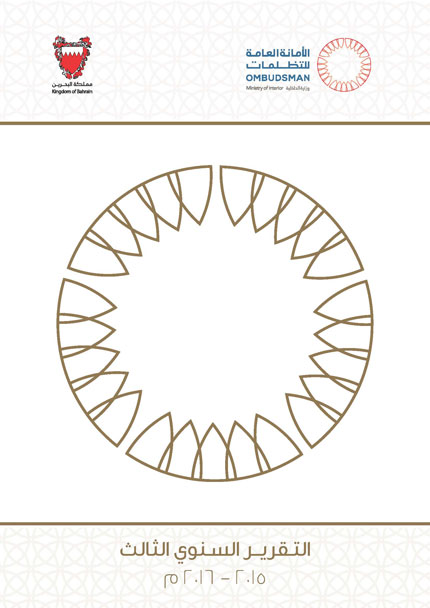
|
 |
 |
|
|
|
|
|
|
|
|
|
|
|
|
|
|
|
|
|
|
|
|
|
|
Ombudsman Office: More Professionalism & TransparencyThe Office of the Ombudsman has issued its third annual report on its activities, which specifically relate to the investigation of complaints received against the practices of Interior Ministry staff. The Office of the Ombudsman has been established on the basis of the recommendations of the Bahrain Independent Commission of Inquiry (BICI), known as the Bassiouni Report. In this capacity, the Ombudsman Office is a key element in addressing the effects of the 2011 events. It is also seen as one of the important institutions involved in the protection of human rights in Bahrain.
The new annual report of the Ombudsman Office, provides an opportunity to examine the activities it undertakes, as well as the progress made in terms of establishing itself and improving Its services. Perhaps the first thing that draws attention in the report, is the notable increase in the number of people submitting grievances or seeking assistance from the Ombudsman Office, which indicates increased confidence in the Office’s role and activity within the Bahraini society. Perhaps, this is primarily due to the clear attention shown by the Ombudsman Office with respect to developing its mechanisms, upgrading the capacities of its staff, in addition to increasing the level of coordination of its activities with those of relevant official institutions, such as the Ministry of Interior, the Public Prosecution, the Special Investigation Unit (SIU) and the Prisoners and Detainees Rights Commission (PDRC). The Ombudsman Office has recently been keen on strengthening ties with relevant regional and international bodies and institutions and seeking to benefit from their expertise by organizing various events. The Office has also been keen on creating closer links with civil society and international human rights organizations, as well as responding to their concerns in a manner that reinforces confidence in the Office’s efficiency and independence. This includes follow - up of the cases raised by these organiz?tions, even in cases where the aggrieved parties do not submit their grievances. This year’s Ombudsman report, included statistics on the nature and number of complaints and assistance requests received by the Office during the reporting year. The report also identified the nature and number of actions taken regarding these issues, such as referral to relevant bodies, shelving for lack of evidence or ongoing investigation. The report outlined 12 sample cases investigated by the Ombudsman Office, including the steps taken for fact finding and the actions taken to address the issues subject of the complaints or grievances. Of course, it was not possible, in legal terms, to mention the names of the complainants in those cases. However, the presentation was characterized with a high degree of transparency, which provides practical evidence of the Ombudsman Office’s high level of professionalism in conducting the tasks entrusted?to it. As to deaths in detention centres which amounted to 7 cases during the reporting period, the ombudsman Office for its part, has conducted the required investigations, within its mandate, and provided an elaborate account of the outcome of investigation for each case. Based on its experience in this area, the Ombudsman Office issued several recommendations for reform and rehabilitation centres, with a view to upgrading their efficiency and providing them with the necessary resources to make them better equipped and prepared to handle contingencies. It is hoped that this open-door approach would be reassuring and allay the concerns raised by various international human rights entities, including governments, formal international organizations and NGOs, in relation to various aspects of the human rights dossier in Bahrain. It is also hoped that increased transparency and professionalism will strengthen confidence in the Office of the Ombudsman and ultimately lead to addressing the shortcomings in Bahrain’s human rights dossier. |
